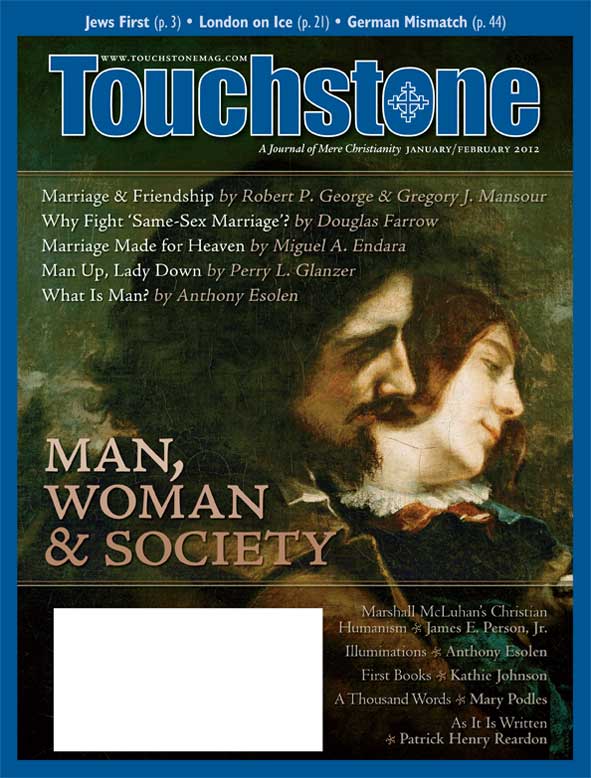Pieper’s Pearl
The Platonic Myths
by Josef Pieper
Introduction by James V. Schall
St. Augustine’s Press, 2011
(94 pages, $11.00, paperback)
reviewed by Graeme Hunter
Platonic dialogues usually present Socrates, the father of Western philosophy, in conversation with other people. What are called the “early dialogues” present a Socrates who examines his interlocutors and refutes their beliefs. In later dialogues, Socrates’ own beliefs (or more likely those of Plato) take center stage. Plato is a powerful writer and Socrates a heroic figure. Not to read the dialogues is to neglect one of history’s defining personalities, and some of world literature’s highest peaks.
But here is something surprising that only a few of Plato’s readers have understood. In many dialogues, Socrates tells mythic stories, and treats them with more sincere deference than he ever shows toward his interlocutors. Socrates claims to believe these stories, and exhorts his interlocutors to believe them too, saying they are the key to leading lives worth living. He often adds that it is not the exact imagery of the story that is important, but the truth it symbolizes and the piety it demands. These extraordinary stories are the subject of Josef Pieper’s profound essay, The Platonic Myths.
Pieper’s short book appeared originally in German in 1965. Dan Farrelly’s elegant translation makes it available in English for the first time. And this is a lucky thing both for scholars and for the quickly vanishing class of general readers.
Scholars will find here an account of Plato’s myths that makes today’s academic consensus about them look shallow. Not that defenders of the consensus pay Pieper much heed. He does not write in the pretentious prose that is prized in academia. He writes as an inquirer and a philosopher would, if he stumbled onto a pearl of great price. He writes as a man who has heard tell of a timeless and fruitful truth, the logos that underlies all things, to which philosophy and myth in different ways give stammering expression. In Plato, Pieper finds a reliable guide to bring him close to this vivifying and liberating truth.
Serious readers will not regret accompanying Pieper on his journey of discovery. “This little book . . . is something that I have been looking for all my life,” writes Father James Schall in the Introduction, “but I did not know that this was what I was looking for. I recognized it when I read it.” Many readers, I predict, will make a similar discovery.
A Kernel of Truth in a Shell of Imagery
Plato’s myths are stories that Socrates tells, but that he did not invent. He says he has heard them from wise men and women. And hearing, he believed.
The great myths in Plato concern first and last things. They tell us where we came from and where we are going.
But why, you might wonder, would a philosopher resort to the language of myth? Aren’t philosophers supposed to unfold in the form of arguments what they have learned by reasoning from first principles? Pieper gives the right answer to this good question:
The future that is beyond our experience—and also the origin of the world and of mankind—these can only be grasped in information that, while not the result of experience and thinking, is able, however, in a unique way to throw light on and open up for us both experience and thought.
In other words, human experience cannot explain the force that made it possible, or the end for which it was created. But if, through myth, we hear a rumor of first and last things, then, with its help, we may begin to make sense of our experience.
The ancients who handed down the myths did not originate them. They were merely the first to receive them. The myths themselves, Plato says, were “a gift from the gods,” a kernel of truth about first and last things, wrapped in a shell of imagery. These truths are known in the hearing, and what we hear, we are summoned to believe.
Pieper points out how the tradition of translating and interpreting Plato has done its best to obscure the relation between hearing what has been revealed, and believing. But the original Greek makes that connection plain, and Christian readers will notice it. When we read that Socrates has learned these myths ex akoes (from hearing), and that he has faith in their truth, we are reminded of St. Paul’s observation that “faith comes from hearing” (ex akoes). It is one of the deepest truths about the origin of religious knowledge, though Plato’s translators love to fudge it by making Socrates say that our knowledge of mythic truth comes from “hearsay.”
Plato traces religious knowledge back to some original logos, of whose ultimate meaning he offers no further explanation. But Christians can see, in Pieper’s words, that the “indestructible truth of mythical tradition stems . . . from the same Logos that in Christ became man.” “Only the light of this Logos,” Pieper continues, “makes possible . . . the clear distinction between true and false within the actual corpus of tradition, as well as the separation of the ‘true myth’ from the shell of the accidental and irrelevant.”
A Necessary Preparatory Thinker
Because of the finality of the revelation we have received, many Christians think we need no other. But this is a mistake. It resembles the mistake of Marcionite heretics in the early Church, who thought that Christians could dispense with the Hebrew Scriptures because a greater revelation had come. But Jesus, of course, valued the Hebrew Scriptures, and came not to abolish, but to fulfill.
Plato is not as important as the Hebrew revelation, but he forged some of the vocabulary and many of the images in which some of the Hebrew Scriptures, particularly the Wisdom books, expressed themselves, and by which the early Christian Church explained its new revelation to itself. Also, a long Christian tradition regards Plato as one of the necessary preparatory thinkers who equipped pagan minds to receive the gospel. Pieper shows that Plato still has much to teach us about what to listen to, and how to listen. •
Graeme Hunter is a contributing editor to Touchstone and Research Professor of Philosophy at Dominican University College in Ottawa. He is the author of Radical Protestantism in Spinoza's Thought (Ashgate).
subscription options
Order
Print/Online Subscription

Get six issues (one year) of Touchstone PLUS full online access including pdf downloads for only $39.95. That's only $3.34 per month!
Order
Online Only
Subscription

Get a one-year full-access subscription to the Touchstone online archives for only $19.95. That's only $1.66 per month!
bulk subscriptions
Order Touchstone subscriptions in bulk and save $10 per sub! Each subscription includes 6 issues of Touchstone plus full online access to touchstonemag.com—including archives, videos, and pdf downloads of recent issues for only $29.95 each! Great for churches or study groups.
Transactions will be processed on a secure server.
more from the online archives

24.6—Nov/Dec 2011
Liberty, Conscience & Autonomy
How the Culture War of the Roaring Twenties Set the Stage for Today’s Catholic & Evangelical Alliance by Barry Hankins
calling all readers
Please Donate
"There are magazines worth reading but few worth saving . . . Touchstone is just such a magazine."
—Alice von Hildebrand
"Here we do not concede one square millimeter of territory to falsehood, folly, contemporary sentimentality, or fashion. We speak the truth, and let God be our judge. . . . Touchstone is the one committedly Christian conservative journal."
—Anthony Esolen, Touchstone senior editor








